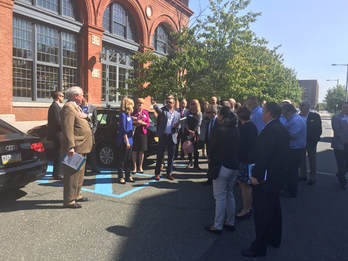 This past spring, Governor John Carney and the Delaware legislature put in place two key foundations for economic development: Modernizing the Coastal Zone Act and the Delaware Prosperity Partnership, the new public/private nonprofit responsible for recruiting new employers to the state. In addition, the City of Wilmington is undergoing the creation of a master plan to help revitalize Delaware’s corporate hub. An example of such a transformation lies just 20 miles to its north. On Monday, September 11, The Delaware State Chamber hosted a trip to the Philadelphia Navy Yard. The Urban Land Institute has hailed the venture as one of the “most successful” redevelopment projects in U.S. history. The Navy Yard is a 1,200-acre urban development, offering the Philadelphia region a mixed use and centrally-located waterfront business campus. The Navy Yard is home to more than 13,000 employees and 152 companies representing industrial, manufacturing, office and research, and development sectors. To date, the Navy Yard has developed 7.5 million square feet of real estate in a mix of historic buildings and new high-performance and LEED® certified construction. Since 2000, more than $1 billion has been invested to transform the site into a world class location for corporations like GlaxoSmithKline, Urban Outfitters and Tasty Baking Company. The PIDC (formally known as the Philadelphia Industrial Development Corporation) is Philadelphia’s public-private non-profit economic development corporation founded jointly by the City of Philadelphia and the Greater Philadelphia Chamber of Commerce in 1958. The PIDC serves as master developer, and oversees all aspects of the Navy Yard’s management and development, including master planning, leasing, property management, infrastructure development, utility operation, and the structuring of development transactions. Reed Lyons, Vice President Navy Yard Development, led our tour and pointed out that the Navy Yard had no public infrastructure when the U.S. Navy handed the site to Philadelphia. The Navy Yard transformation started with little but a vision, and 20 years later that vision has become a success story. Mike Vanderslice, Environmental Alliance, Inc. and Chairman of the DSCC Economic Development Committee, says, “From an economic development perspective, I appreciated what our friends at the Navy Yard had to offer for what's 'working' and lessons they've learned as they continue to develop the historic waterfront area. Being in the environmental consulting field, it was impressive to see how far they have taken this former heavy industrial, blighted area, and turned it around into a vibrant campus for businesses.” Link to Urban Land Institute’s article on the Navy Yard: https://urbanland.uli.org/development-business/historic-rehab-philadelphias-navy-yard/ Link to the Navy Yard: www.navyyard.org
0 Comments
On August 1, 2017, The Mill and Innovincent presented the first Millenial Summit (#MillSummit), a full-day event held at the Chase Center on the Riverfront. Over 250 attendees, representing a variety of industries and passions, came together to network, learn from topic experts and explore the diverse community that Wilmington has to offer. The Delaware State Chamber of Commerce was pleased to have its Delaware Young Professionals Network involved with the event's planning committee.
The event kicked off with Sara Fischer, Axios media reporter, who took the audience through the data and trends of technology use among millennials. A panel on crafting one's personal brand followed, with Governor Carney giving closing remarks for the morning session. The keynote address was given by Ambassador Vlora Citaku, Ambassador of the Republic of Kosovo to the U.S. Her compelling journey from refugee to ambassador made for an inspiring speech, and a dynamic Q&A session with the audience. Multiple breakout sessions and panels were held throughout the day. DSCC's Events Manager and Program & Communications Specialist, Kelly Wetzel, served as a panelist on leadership through nonprofit and community involvement; and James DeChene, Senior VP Government Affairs, moderated an afternoon discussion with some of the youngest elected officials in Delaware about political and legislative engagement. To see the day's full lineup of panels and speakers, visit millsumit.com. by Mark DiMaio
The 9th Annual Vision Coalition Conference took place on Monday, November 14th at the University of Delaware’s John Clayton Center. The conference brings together school leaders, educators, elected officials, non-profits and business leaders to focus on improving Delaware’s education system. This year’s meeting theme centered on working to “close the achievement gap” for the state’s disadvantaged and special needs children. Keynote Speaker, Paul Reville, a Harvard University professor, focused his remarks on addressing persistent achievement gaps especially for students who face hurdles to learning. Professor Reville theme of “all means all” asked stakeholders to focus on policies that ensure that every student can access a quality education. During the conference, attendees participated in small-group discussions on how Delaware can to a better job of connecting schools to government agencies and nonprofits that provide services linking students and families to health care, language training, shelter and food. Many Delaware teachers are left to assist their student personal issues while still trying to teach. Other discussions concentrated on the state’s decades-old school funding system and the need for increased funding for schools serving students in poverty and English-language learners. There was also the realization that continued tight state budgets with a projected revenue shortfall could limit state funding to address additional student needs. Dr. Dan Rich, University of Delaware Professor of Public Policy, was awarded the Order of the First State by Governor Jack Markell. Professor Rich received the award for his tireless work to improve education for all Delaware students and service to his fellow Delawareans. 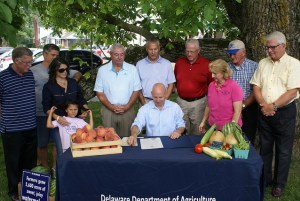 Organizations wanting to launch or expand an urban agriculture or community garden project to benefit their neighborhood can apply for new micro-grants from the Delaware Department of Agriculture, Secretary of Agriculture Ed Kee announced today. “The last few years have seen tremendous growth and interest in local community agriculture projects across our state, and we want to support that even more,” Kee said. “These micro-grants will provide seed money to get gardens off the ground or expand current ventures. They will strengthen their communities, provide nutritious locally grown foods, and help our young people develop connections to the land.” The micro-grant program offers up to $1,000 per project for supplies, materials, seeds, or minor equipment. Under this year’s pilot program, $10,000 in reimbursement funding is available statewide. Eligible applicants include nonprofit organizations, religious organizations, municipalities, schools, or organized neighborhood associations. For-profit businesses and individuals are not eligible. Applications must be received by 4:30 p.m. April 1. For more information and an application, visit de.gov/urbanag, email [email protected], or call the Department of Agriculture Marketing Section at 302-698-4500. by James DeChene
In many respects, the last few weeks for Delaware have been similar to the grieving process of losing a loved one. The familiar has been replaced by uncertainty, and there is difficulty imagining a future without the comforting steady presence of an entity that has been an integral part of so many lives in this state. If you’re like me, coming from a family that was literally and figuratively sustained by DuPont (both of my grandfathers were engineers, one in Seaford and one in Wilmington, who helped put me through college) the news of a reshaped, renamed, rebuilt, co-branded DuPont came as a shock, even though the signs were there that things weren’t as rosy as we had hoped. For now, the uncertainty is still at the forefront. What happens now? What will the impact be to downstream businesses, non-profits and other groups that rely on DuPont and its employees to help meet their own bottom lines? What will a revamped Dow-DuPont look like in Delaware, with specialty products remaining and a strong bid to keep the agriculture business here to come? Just like the steps in the grieving process, we move on. We learn to accept that while we don’t, and won’t, have what once was, we have choices. To cherish the memory, find ways to grow from the experience and focus on positive new steps, or to wallow in self-pity and tarnish those happier times. We are far from the heyday of 30,000 DuPont employees in Delaware, and we’ve survived, and made changes that have seen the state flourish. Most notably we are world renowned in the banking and financial services industries. There is more to Delaware than one company and its history, as rich as it is. The time is now to work together to create opportunities for new business and investment in Delaware. In order to be successful the three major constituents—business leaders, elected officials and nonprofits—must work together for the bottom line. We must champion pro-growth economic development policies that brings jobs to Delaware and we must remember that change is not always bad. The announcement last week that DuPont and Dow intend to formally enter merger discussions resonated throughout Delaware. Even though the merger has to go through the regulatory and shareholder approval process, which will take time, questions are quickly emerging as to what the merger will mean in terms of economic impact for Delaware. Separately announced by DuPont was a global restructuring plan that will result in a 10% reduction in global workforce, which is bound to impact the 7000 employees currently working in Delaware.
Taken together, these announcements create many questions about state finances as the calculations begin on what losses due to a diminished DuPont will mean to personal income tax, corporate income tax, gross receipts and property taxes throughout the state. Coupled with what could also be a reduction in philanthropic and nonprofit support, there may not be a person in Delaware who won’t feel the changes. DuPont has been a Delaware institution for over 200 years, a fact that the average Delawarean can recite on command. The company history is so intertwined with Delaware’s there’s in some sense an impending loss of Delaware’s identity—what does Delaware look like without a sustained DuPont presence? As we seek answers to these questions, it’s important to know that the process to complete the merger and execute the spinoffs will take up to three years, and during that time the Chamber will be working closely with DuPont, state government and local business to examine all options to navigate whatever shifts in the economic base may be created. At the same time, there is potential that at least one or more of the spin-off companies could be located in the state. These would be fortune 500 companies with powerhouse brands that have market leadership and would be better positioned for growth and investment after the spins. The Chamber will work closely with DuPont and state officials to foster a business climate that will be attractive for the future spinoff companies to locate their headquarters in the state. It is hard to believe the day has come when our close-knit Delaware community is saying good bye to Charlie Cawley. I could talk about the great organization he built or the financial contributions MBNA made to the state, but what really stands out is the man himself. He was a giant, a bigger than life presence in our community for over two decades. It was an era that many of us were fortunate to experience firsthand. Sure, his outreach went far beyond Delaware, but what an impact he had on Delaware!
Mr. Cawley’s leadership changed the landscape of the city of Wilmington. He boosted the nonprofit community through his personal philanthropy, but more importantly, he ingrained that spirit of giving back to the community in his employees. And indeed, they did give back. His leadership style created goodwill in the community that ran deep and touched the lives of many in need. He did most of his work quietly and without fanfare. It goes without saying that his contributions to Delaware were immeasurable. Mr. Cawley’s hands on approach to the community, the personal touch and watchful eye, is sorely missed by our city. In 2000 Charles M. and Julie P. Cawley were awarded the prestigious Josiah Marvel Cup by the Delaware State Chamber of Commerce. This annual award honors a Delawarean who has made an outstanding contribution to the state, community or society. Mr. and Mrs. Cawley are the epitome of what this award represents. We all share in your loss Mrs. Cawley and send you our deepest condolences. Everyone has a story of how Charlie Cawley touched their lives. He will be remembered fondly – a mark of a life well lived. It is only appropriate that we honor him in this season of Thanksgiving. I ask you to do something selfless today. Take a moment and think about how you can give back to the community. One act of kindness….in memory of Mr. Cawley. Quite simply, we focus our core initiatives to address the concerns of the entire business community.
The Delaware State Chamber of Commerce is the preeminent statewide business organization promoting a strong business climate in Delaware. We strive to create a statewide economic climate that enables all businesses to become more competitive. Our team consistently meets with Delaware’s Congressional delegation and plays a leading role on issues before the General Assembly. Our Board of Directors, Board of Governors and committee engagement assist in promulgating rules and regulations stemming from the various federal, state and local agencies that oversee business activity. We are proud to be leaders on the policy front. Recent achievements include:
The DSCC is a nonprofit organization. We depend on the support of our members to accomplish our mission. We partner with other advocacy groups and serve as the leading voice of the business community. Our leadership helps create jobs, promote business and improve the quality of life for all Delawareans. Your membership dollars and your support through programs like the Annual Dinner, Superstars in Education, Superstars in Business and our Legislative Brunches allow the State Chamber to be your dedicated voice in Dover. We are proud to advocate on your behalf addressing the challenges of today and exploring the opportunities of tomorrow. This year’s winner of the Marvin S. Gilman Bowl has never been one to pursue public recognition. Rather, Richard “Dick” Hatfield is a quiet, tireless, hardworking embodiment of the entrepreneurial spirit. Starting his first business at the age of 18, he has built a real legacy for all his endeavors both in business and in the community.
After serving his country in the US Army, he was right back to work developing opportunities to grow his skills and his business. The business that is his life’s passion was started in 1956, Colonial Parking, Inc. From a single location, our recipient grew his company over the nearly 60-years to a regional organization recognized for integrity, professionalism and service excellence. It employs over 230 people to manage over 100 locations serving in excess of 45,000 customers every day. But first, we need to back up to recognize all the lives he’s touched along the 60-year journey. After several years in business, Mr. Hatfield became active in the National Parking Association where he ultimately served as President from 1975-1976 and continues to serve on the NPA’s National Leadership Advisory Council. Relationships developed there led to the expansion of his business bringing him and his family to Delaware in 1965. The partnership developed from that continues to this day, 50-years later. General characteristics:
It is his long-term focus and desire to develop lifelong relationships that may lead to other opportunities that has crafted this business style. The sum of his win-win and long-term philosophies has also led him to be one of the strongest advocates for the City of Wilmington. For the Dick Hatfield, it’s all about what’s good for the city, knowing that what’s good for the city will ultimately be good for everyone in the city. He is a deeply committed not only to his families, both at home and at work, but also to the greater community. This commitment has been demonstrated by volunteering for a number of community organizations throughout his career:
Needless to say, there is no one more deserving of recognition for his hard work and dedication to the community. The Delaware State Chamber of Commerce and the Small Business Alliance congratulate Mr. Hatfield on this prestigious honor. The Marvin S. Gilman Bowl was established by the Small Business Alliance of the Delaware State Chamber of Commerce in 2008 to honor an individual who has made outstanding contributions to small business and nonprofit organizations of Delaware. The Bowl is awarded annually in the memory of Marvin S. Gilman. This recipient is held in confidence until the Superstars in Business awards luncheon, which took place on Tuesday, November 10, 2015. In stark contrast to the News Journal’s “Save our City” editorial that ran on Nov. 11th lamenting the bleak state of the City of Wilmington on Nov. 10th, in a sold out event featuring over 300 attendees at the Hotel DuPont, the State Chamber awarded four Superstars in Business Awards to companies voted outstanding by a selection committee comprised of their peers. SoDel Concepts, Back to Basics Learning Dynamics, Inc., Bernardon, and the Girl Scouts of the Chesapeake Bay took home awards in categories based on employee number, and in the case of the Girl Scouts, they won for best nonprofit organization.
A separate award, the Marvin S. Gilman bowl, was awarded to Colonial Parking founder Dick Hatfield for his dedication and service to his employees, the city of Wilmington and to the business community at large. Surrounded by his family, Mr. Hatfield expressed his love for his work, for his family and for those employees who have helped make him successful. The event also featured a keynote address by World Cafe Live founder Hal Real, who gave a history of how his career evolved, the forces behind starting WCL in Philadelphia, and most importantly, what drove his decision to expand to Wilmington and how successful this venture has been. The stories shared by the Superstars winners and by Mr. Real show there is already a dedicated segment of Delawareans committed to making sure the city of Wilmington returns to its heyday as a bustling metropolis where people want to live and work, and where businesses can flourish. Success is happening, and momentum is growing, despite what stories grab headlines. It is important to remember that we all collectively have a vested interest in seeing our city thrive, and it is incumbent upon the business community to lead the charge of developing and investing in businesses that will help reach that goal. The Superstars in Business Awards are a prime example of that initiative, and should be a model for others to follow. |
Archives
July 2024
Categories
All
|
|
Copyright Delaware State Chamber of Commerce, Inc.
All Rights Reserved. PO Box 671 | Wilmington DE 19899 (302) 655-7221 | [email protected] | sitemap |
|

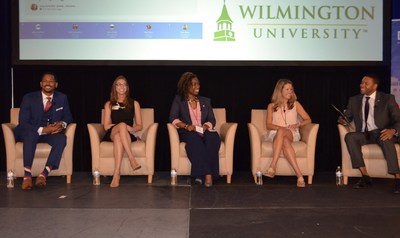
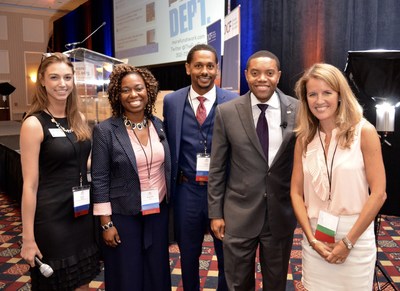
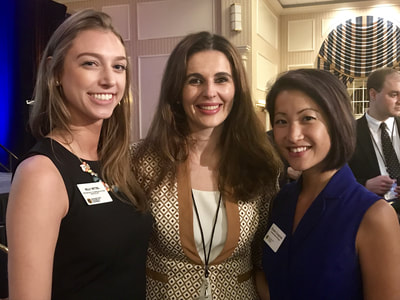
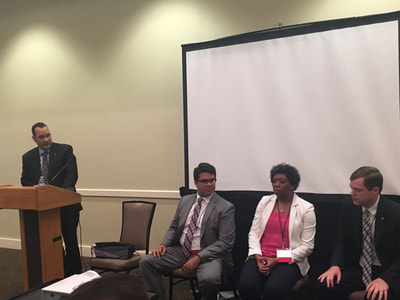
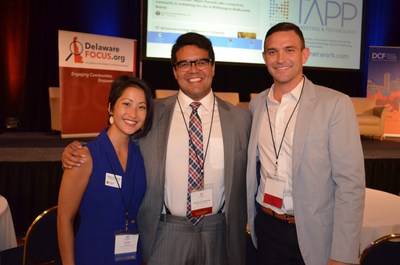
 RSS Feed
RSS Feed